I started my marketing career as an SEO analyst. Back in 2010, the process of backlink building was fairly easy. I’d see people putting together a press release and distributing it to hundreds of no-name platforms. Some would leave a slew of useless comments peppered with links beneath a blog post. Others would write a low-quality article that looked more like a random bunch of words put together, turn it into a link cemetery and call it a guest post.
Then Google Update came into play and showed everyone who’s the boss. No more low-quality content, spam in the comments or link farms. “Don’t build backlinks, earn them,” said Google and penalized those who violated the rules. Webmasters bought into this “Content is King” agenda and focused on creating valuable content. They’d spend days or even weeks crafting that really helpful article, put it online and wait for the backlinks to come. Well, they never did.
It turned out, you still needed to promote and distribute content if you wanted Google to notice and rank it. The new link building techniques and approaches that emerged were more mature, complicated, and required far more time, expertise, creativity, or networking. Today, we have no choice but to adopt them if we don’t want our content to be buried on the last pages of a Google search. In this post, we’ll go over backlink building techniques that Chanty and fellow SaaS companies will use in 2023 to get to the top of Google’s search results.
Many of the strategies mentioned below follow a similar pattern to build links. First, identify a backlink building opportunity. Follow this up by identifying the right person (usually the website manager or marketing manager) at the website you are interested in. Finally, reach out to them with a personalized message that conveys your value proposition.
#1 The staircase guest blogging strategy
This is the strategy we rely on heavily at Chanty, it played a major role in getting our team chat from 0 to 10K leads. If you are new to guest blogging, start by reaching out to less popular platforms with domain authority that are not far from yours. Writing high quality guest content is key here; otherwise, you’ll be stuck on the “less popular domains” stage forever. Editors (and readers) love articles based on personal experience. Luckily, every SaaS startup has a story of growth, so it should be pretty easy to incorporate your company’s experience into an article.
Then, with enough examples of your previous guest posts, you can gradually increase the quality of the platforms you are pitching to. This is how Chanty got to publish on top tier platforms like HubSpot, Entrepreneur, Search Engine Journal, Marketo and many more.
Make sure your outreach is personalized and authentic. While using outreach templates can work OK when sending emails to less-known websites, editors working for the big names won’t even notice your pitch if you don’t do your homework well. E.g., I had to send three follow-up emails to the editor at Entrepreneur before she even noticed me. For HubSpot, it was the connecting editor on LinkedIn who paved the way for our publication. Get creative and build relationships before pitching. If you want to learn more, read my article on HubSpot where I’ve covered the entire process step by step with the examples of exact pitches I’ve sent to some of the editors. Different mail merge software can also help you personalize your guest post outreach because it allows you to easily replace fields like names.
#2 The stolen images strategy
We accidentally discovered this strategy when searching for our images online. Chanty is lucky to have an in-house graphic illustrator who makes amazing images for our blog posts. As it turned out, our images got quite popular online and people would just use them without giving Chanty proper attribution.
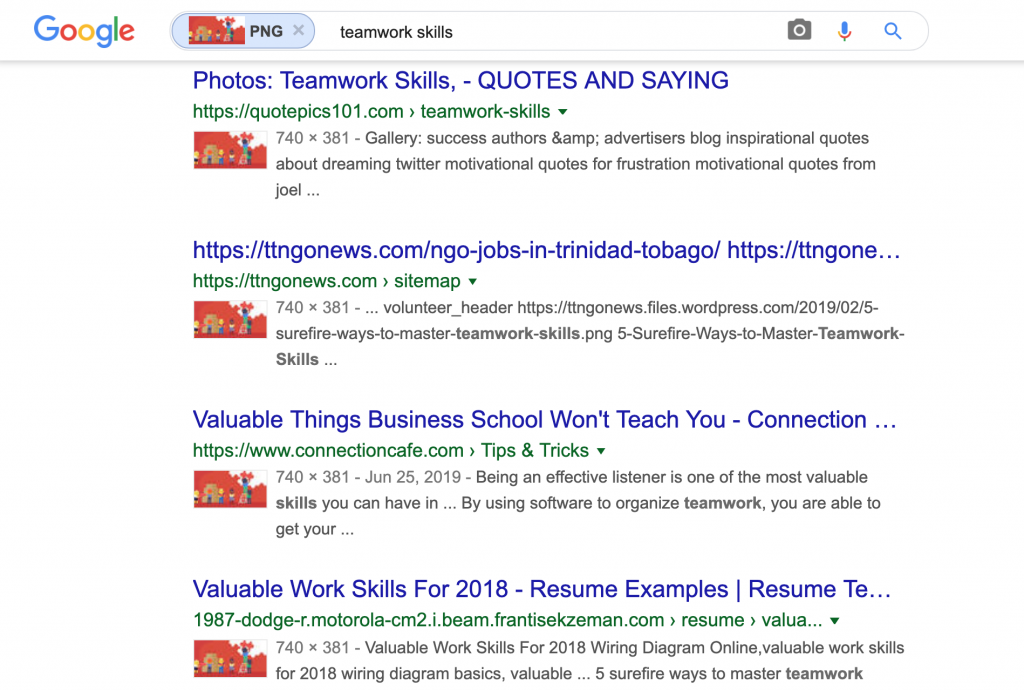 Google image search results for one of our blog images
Google image search results for one of our blog images
On a mission to bring justice to the world, we’ve launched an outreach campaign asking those who used our assets to credit Chanty. Unfortunately, half of the platforms decided to just delete our image. However, the other half was happy to put up a backlink. This approach helped us get plenty of links from a bunch of platforms, including Wrike.com. You can read about the steps we’ve taken along with the exact email template we send out in this post published on Foundr.
Bonus tip: CC’ing your lawyer and mentioning this in the email significantly increases the response rate 😉
#3 The comention strategy
If you write a bunch of guest posts every month like we do at Chanty, sooner or later you realize that writing guest posts is expensive (what some copywriters charge is just insane). So it takes a lot of time, money and effort and all you get is a single backlink. Well, there’s a way to make this process more effective by cooperating with fellow SaaS people.
Start by finding a partner or two (we have more than a dozen by now) who write guest posts on a regular basis. Then, you guessed it, ask them to mention your product in their articles and you’ll do the same for them. This way, with the same amount of effort and money you can double, triple, or even quadruple your guest blogging results.
There’s a free tool (sign-up is pre-moderated) that helps you find partners for this cooperation called CoMention. It also simplifies the process of tracking mentions, keywords, and urls. Most importantly, you can copy and paste an article you are working on, click “Find keywords,” and it shows backlink building opportunities within it so you don’t miss a chance to link back to your partners.
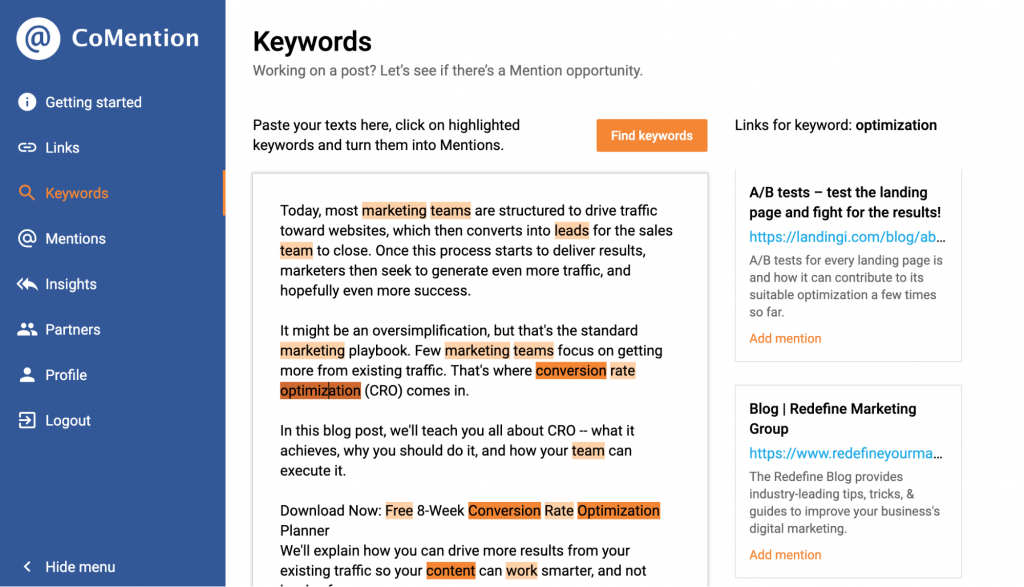 Finding backlink opportunities within your article in CoMention
Finding backlink opportunities within your article in CoMention
#4 The mention-me-back strategy
Naturally, we get to mention all sorts of websites when supporting our arguments, whether by referring to the information source or simply putting together a list of free SEO tools.
These websites are not our partners. In fact, some of them (like in the example below) are our competitors. But who said you couldn’t get a backlink from a competitor? Well, once our guest post is published, or, even better, at the writing stage, we reach out to the platforms we are about to mention and ask if they can link to Chanty from their website:
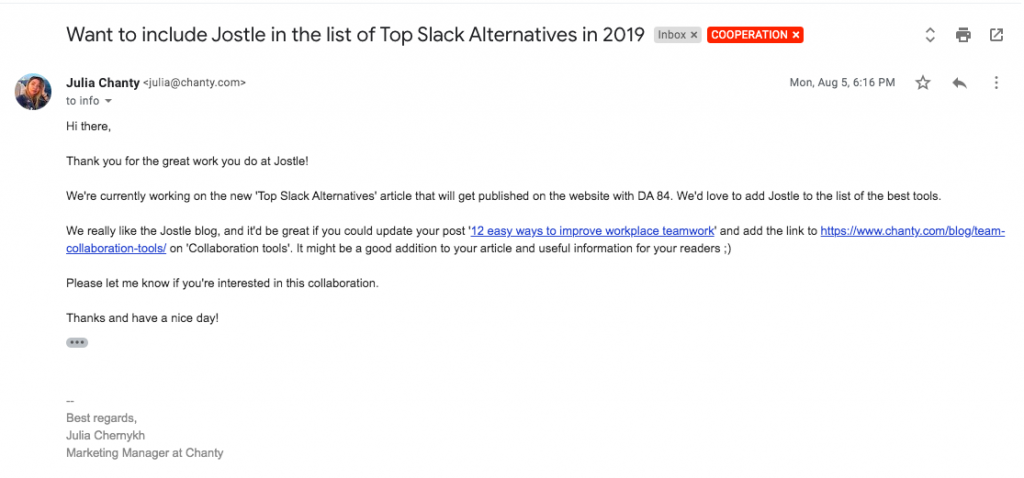 Reaching out to the guys from a product we are about to add to our guest post
Reaching out to the guys from a product we are about to add to our guest post
The approach works great for us, resulting in high-quality, relevant backlinks in 50% of cases. If you are writing guest posts, you should definitely give this strategy a try.
By the way, if you haven’t already, you should join the B2B bloggers boost group on Facebook. One of the greatest implementations of this strategy I’ve seen was by a guy from this group. He was writing a listicle post for high-DA websites and suggested including your website if you linked back to his personal blog. Can you imagine the results of this cooperation with a single “50 productivity tools” article? I think it’s simply brilliant; hats off to the guy.
#5 The outdated tools strategy
If you are familiar with the team communication market, you’ve probably seen this in the news about a year ago: Slack has acquired Atlassian Stride and HipChat, its two major competitors at the moment. What did it mean for us? The opportunity to get a bunch of backlinks, of course.
We conducted a search for domains that backlink to HipChat and Stride and contacted the platforms, informing them that they have an outdated link (not broken, just outdated) in the article and suggesting that they replace it with Chanty, a communication tool that is still active. We’d also include articles from HubSpot, Smart Insights, JotForm, and Workzone where Chanty has been featured as a top Slack alternative to bring some social proof.
This approach is very similar to the broken links strategy that you can also successfully adopt for your business. If none of your competitors went out of business recently, look for the broken pages (those with 404 errors) of your competitors and give the guys linking back to those a heads up. You can learn more about the broken link strategy in a great post by Ahrefs.
#6 The missing backlink strategy
This is another technique you’ve probably come across. If you’re a well-known brand, you’re likely getting a lot of mentions in all sorts of articles. Some will have backlinks to your domain; some won’t. Your job is to find those mentions (we set up alerts in Ahrefs) of your brand and reach out every time you see a mention with no backlink to your product. This is an email we received from HubSpot a while ago asking us to backlink. I’m sure for a famous brand like HubSpot, this technique works like magic:
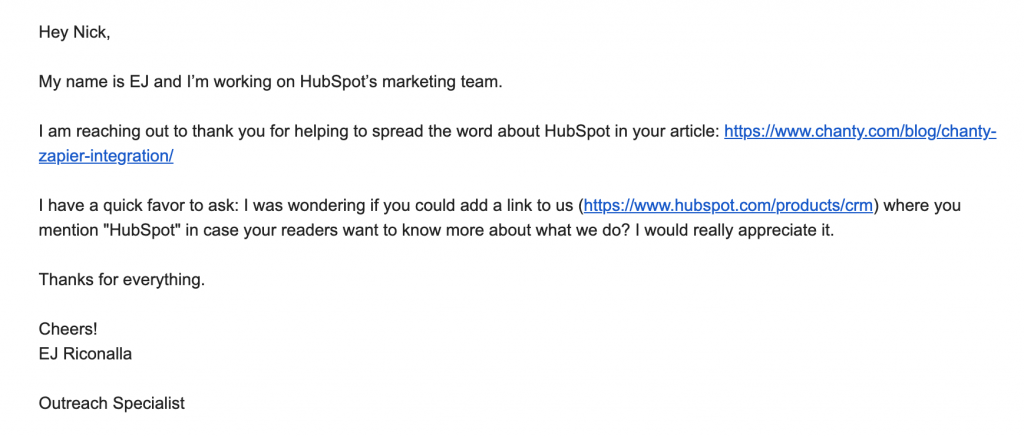 HubSpot email asking for a backlink from our website
HubSpot email asking for a backlink from our website
Less-known brands that don’t get mentioned online very often can simply reach out to a website and ask for a backlink. If this is your case, make sure you have a great piece of content in hand that will add value to the platform you are reaching out to. E.g., this is exactly how infographics by EzCater got to our blog article—we got an email asking us to check it out and, if possible, add it to our blog post, and… we just loved it.
#7 The industry podcasts strategy
Our friends at Better Proposals have seen pretty good results with this technique. If you can speak on the topic you are pitching without weeks of preparation for about 20-50 minutes, podcasts could be a great choice for you. Getting an interview on a podcast is a process very similar to guest blogging and there are various recording and editing software that are beginner-friendly. Just like with guest blogging, you get all sorts of perks like establishing industry expertise, getting referral traffic, and increasing brand awareness. The steps you should take are simple:
- Research the industry podcasts
- Pitch your topic to the host
3. Get interviewed
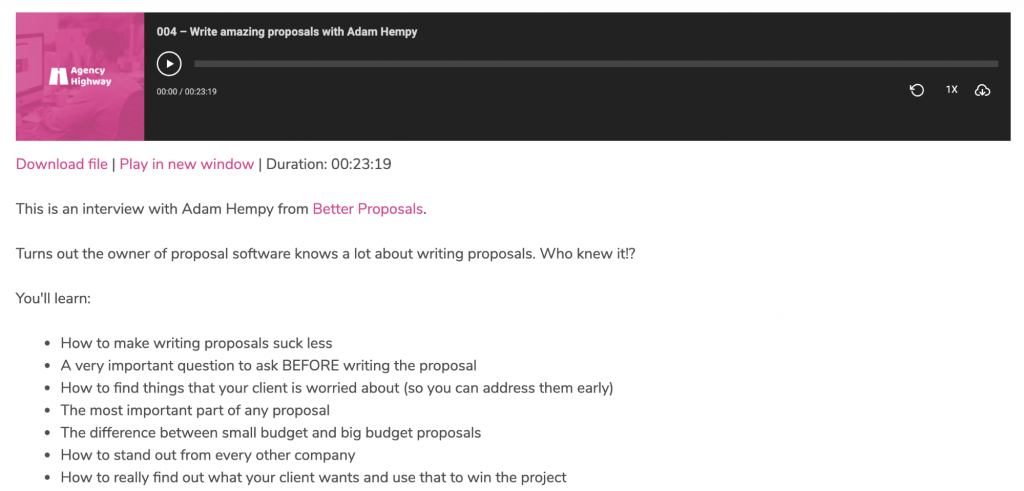 The published audio interview with Adam Hempy, CEO and founder of Better Proposals
The published audio interview with Adam Hempy, CEO and founder of Better Proposals
Every podcast has a description or, sometimes, even a text version of the audio. To ensure the host will backlink to your website, use this little trick that Adam has shared with us – mention an article/ebook, a report, or whatever you want to link to in the interview. Say you’ll leave a link to it in a description. This way, you won’t have to haggle with the host about including a link to your website. There will be no other choice.
#8 The skyscraper technique by Brian Dean
A few years ago, well-known SEO expert Brian Dean coined the concept of “skyscraper link building.” It’s about writing content better than your competitors—more engaging, more educational, covering more aspects than those search results already ranking in Google’s top 10. Then, you are supposed to reach out to the websites backlinking to your competition and astonish them with your outstanding content to the point where they have no choice, but to backlink to your post.
I am a big fan of Brian Dean’s; his content is very useful and inspiring. At the same time, we had to realize that what works for marketing, doesn’t always work for the rest of the industries. The skyscraper link building technique simply didn’t work for us. We’ve even written about our failure on Search Engine Journal. However, I don’t want to discourage you from giving it a try. Let’s see if this technique is something you should spend time and effort on:
- Does your post solve a business issue and your findings could be implemented right away to improve someone’s business?
- Can you write a post that’s head and shoulders above everything that’s already on the Google top 10 for your keyword?
- Do you have a recognizable brand?
- Are you a lucky guy/gal?
If you answered yes to all four questions, the Skyscraper link building technique is likely to be a good fit for you. And if you are doing SEO for news websites you should consider leveraging trending topics and breaking news to attract high-quality backlinks.
#9 The backlink exchange strategy
This technique is as old as the hills. I link to you, you link to me—simple as that. We get offers for backlink building every week. Sounds like a great way to grow your backlink profile, right? Well, I am not too excited about this approach. First off, Google states that excessive link exchanges could “negatively impact your site’s ranking in search results.”
It gets even worse if you exchange backlinks with low quality or irrelevant websites. To avoid this, you should always check website ranking.
The rule of thumb here is not to make this technique your priority. While backlink building between Chanty and relevant niche websites may occasionally happen, we prefer to avoid this practice whenever we can. Instead, when we get a backlink building offer, we suggest mentioning the website that’s reaching out in our future guest posting opportunities.
#10 The PBNs strategy – the one you should avoid
Since I’m writing the Ultimate Guide on link-building strategies for SaaS, I thought I’d cover PBNs as well as why you should stay away from them. One of the most common link building mistakes that you should avoid is buying links from such low-quality websites or participating in link schemes as these can result in penalties from search engines and damage your website’s ranking and reputation.
Just like every other SaaS marketer out there, you’ve probably been approached by a foreign stranger on LinkedIn, offering you “guest posts,” “websites,” or just “backlinks.” If you dig deeper, you’ll find out about a network of low-quality, low-traffic websites created solely for the purpose of selling backlinks.
I have a good old friend who is still using PBNs to promote his clients’ websites. He’s a frequent guest at SEO conferences, covering his latest success stories and incredible growth. Being a curious gal that I am, I’ve called the guy and asked him all things PBN. With a smart approach, he said, PBNs can help you a great deal in SEO. Luckily, he’s never been exposed and banned.
I’d say the keyword here is “yet.” It’s just a matter of time before Google spots another network and shuts it down, ruining your business. Although it still works for some, I wouldn’t risk years of our work getting hard-earned rankings, building website reputation and trust to lose it all overnight. So next time someone approaches you with a “backlinks” offer on LinkedIn, the best thing you can do is to ignore the message.
In the end…
As you can see, backlink strategies, no matter which one you choose, go hand in hand with great content. Guest blogging? You need to write great content to achieve impressive results. HARO pitches? Great content again. Collaboration with other SaaS partners? Impossible without writing content first. I hope that creating helpful, insightful, and valuable content will become your focus after reading this article. It will form the basis for significantly improving your backlink profile.
Have I missed a backlink strategy? Please, share your proven ways to grow backlinks in the comments below. If you learned something new from my post today, please share it further so it helps more SaaS people. Good luck with your backlinks! 😉








